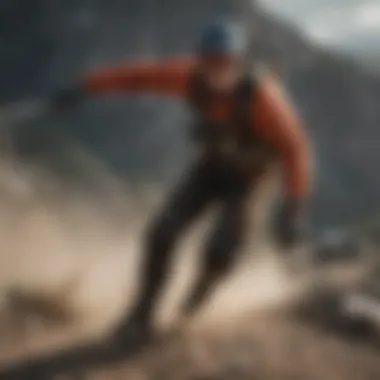Exploring the Intricacies of Fracking in Extreme Sports: A MySportEdge Perspective


Equipment and Gear
When it comes to the intricate world of extreme sports within My SportEdge, having the right gear is crucial for both performance and safety. From durable helmets to specialized ropes and harnesses, the gear you choose can make a significant difference in your experience. Top brands in the industry offer a wide range of products designed to withstand the rigors of extreme sports. Ensuring proper maintenance of your equipment, staying up-to-date with upgrades, and being aware of new advancements can enhance your performance and overall safety on the field.
Introduction to Fracking
Fracking has become a significant topic of discussion within the extreme sports world, especially on platforms like My SportEdge. This section serves as a gateway to understanding the complexities of fracking and its implications for adrenaline enthusiasts and athletes. By delving into the essential aspects of fracking, this article aims to provide a comprehensive overview that sheds light on this controversial practice and its intersections with extreme sports.
Defining Fracking
Fracking, also known as hydraulic fracturing, involves the process of extracting natural gas and oil from deep underground by injecting high-pressure liquid. The method combines advanced technology with geological understanding to access valuable resources that were previously inaccessible. Hydraulic fracturing has revolutionized the energy industry, offering a cost-effective solution for fuel extraction.
The process of hydraulic fracturing
The process of hydraulic fracturing entails drilling deep into the earth and injecting a mixture of water, sand, and chemicals at high pressure to release trapped gas and oil. This technique allows for the extraction of resources from tight rock formations efficiently. However, it also poses environmental risks due to potential water contamination and seismic activity.
Extraction of natural gas and oil
The extraction of natural gas and oil through fracking brings access to abundant energy sources that contribute to global energy security. By tapping into unconventional reservoirs, such as shale formations, fracking has expanded the scope of fossil fuel production and reduced dependence on traditional oil reserves.
Technology involved in fracking
Modern fracking techniques involve advanced technologies like horizontal drilling and hydraulic fracturing fluid to enhance productivity and minimize environmental impact. These innovations have enabled the industry to access previously untapped resources more efficiently, albeit with ongoing debates on sustainability and environmental consequences.


History of Fracking
The historical timeline of fracking showcases its evolution from a rudimentary practice to a sophisticated industry. Understanding the origins and key figures in the field provides insights into the technological advancements and challenges that have shaped contemporary fracking practices.
Origins of fracking
Fracking traces its origins back to the mid-20th century when experiments were conducted to enhance oil and gas production. The initial attempts laid the groundwork for modern hydraulic fracturing techniques, marking a significant shift in energy extraction methods.
Evolution of fracking techniques
The evolution of fracking techniques parallels advancements in technology and geoscience, leading to more efficient and targeted resource extraction. Innovations in drilling practices and well stimulation processes have optimized efficiency while raising questions about the environmental impact of increased fracking operations.
Pioneers in the fracking industry
Numerous pioneers and innovators have contributed to the development of fracking as a mainstream extraction method. Visionaries in the industry have driven forward-thinking initiatives to improve operational safety, environmental sustainability, and community engagement in fracking activities.
Importance of Fracking in Extreme Sports
Fracking sites have emerged as unconventional playgrounds for extreme sports enthusiasts, offering unique terrains and challenges for athletes seeking adrenaline-fueled experiences. The fusion of fracking locations with extreme sports presents a distinctive opportunity for adventure seekers to explore uncharted territories.
Utilization of fracking sites for extreme sports activities
Extreme sports have found a niche in fracking sites, utilizing the rugged landscapes and industrial infrastructure as backdrops for exhilarating adventures. Urban exploration, rock climbing, and base jumping are just a few examples of activities that thrive in these unconventional environments, attracting daredevils and thrill-seekers.


Integration of extreme sports with fracking locations
The integration of extreme sports with fracking locations requires careful planning to ensure safety and mitigate environmental risks. By adapting existing structures and repurposing industrial equipment, sports enthusiasts can engage in high-octane activities while respecting the unique characteristics of fracking sites.
Thrill-seeking opportunities in fracking regions
Fracking regions offer a myriad of thrill-seeking opportunities for adventurers looking to push their limits in unconventional settings. From endurance challenges to aerial stunts, the dynamic landscapes of fracking sites provide endless possibilities for adrenaline-inducing escapades, creating a new dimension of extreme sports exploration.
Environmental and Social Impacts
Fracking, a contentious practice within the realm of extreme sports, has far-reaching implications on the environmental and social fabric of our society. Understanding the profound impact of fracking on both realms is crucial in navigating the complexities of this adrenaline-fueled industry. Its effects extend beyond mere thrills to delve into the intricate web of environmental sustainability and social dynamics, making it a topic of interest and discourse within the extreme sports community and beyond.
Environmental Concerns
Impact on ecosystems
Fracking's impact on ecosystems is a focal point of concern and scrutiny within the extreme sports landscape. The disruption and alteration to natural habitats and biodiversity pose significant challenges and necessitate a careful examination of the trade-offs involved. The degradation of ecosystems due to the invasive nature of fracking operations raises questions about the long-term sustainability of these practices. While providing access to adrenaline-inducing locations, the toll on ecosystems underscores the delicate balance between adventure-seeking and environmental preservation in the world of extreme sports.
Water contamination issues
The issue of water contamination associated with fracking is a pressing environmental concern that cannot be overlooked. The potential risks of polluting water sources through chemical leakage and wastewater disposal loom large, highlighting the need for stringent monitoring and safeguarding mechanisms. This aspect of fracking underscores the interconnectedness of human activities and environmental consequences, emphasizing the importance of responsible practices and regulatory oversight to mitigate detrimental effects on water quality and aquatic life.
Air quality implications


Fracking's impact on air quality raises significant health and environmental concerns, emphasizing the need for comprehensive assessments and mitigation strategies. The release of harmful emissions and fine particulate matter into the atmosphere can have far-reaching consequences on public health and environmental integrity. Addressing air quality implications associated with fracking requires a multi-faceted approach that considers technology, regulation, and public awareness to minimize adverse effects and promote sustainable operations.
Social Ramifications
Community disruptions
The disruptive nature of fracking operations on local communities is a crucial social issue that demands attention and analysis. The influx of industrial activities, infrastructure development, and transient populations can strain community resources and socio-cultural norms, leading to tensions and conflicts. Balancing the economic benefits of fracking with the social cohesion of affected communities underscores the need for dialogue, transparency, and equitable solutions to mitigate disruptions and foster peaceful coexistence.
Health risks for residents near fracking sites
The health risks faced by residents living in proximity to fracking sites are a significant social concern that necessitates rigorous study and proactive measures. Exposure to pollutants, noise pollution, and stressors associated with fracking operations can impact public health and well-being, warranting intervention and accountability from industry stakeholders and regulatory bodies. Safeguarding the health of residents near fracking sites requires a holistic approach that prioritizes community engagement, health impact assessments, and preventive healthcare initiatives to address vulnerabilities and protect vulnerable populations.
Legal and ethical debates
Fracking spurs diverse legal and ethical debates that shape the discourse surrounding extreme sports and environmental responsibility. The clash between commercial interests, regulatory frameworks, and ethical considerations underscores the complexity of balancing thrill-seeking activities with ecological integrity and societal well-being. Engaging in constructive dialogues, advocating for transparent governance, and upholding ethical standards are essential in navigating the legal and ethical landscape of fracking, ensuring accountability, fairness, and sustainability in extreme sports practices.
Controversies Surrounding Fracking in Extreme Sports
Fracking in extreme sports is a contentious subject that warrants thorough examination. The fusion of adrenaline-fueled activities with controversial energy extraction methods raises significant ethical and safety concerns within the extreme sports community. Understanding the risks, regulations, and ethical dilemmas associated with fracking in extreme sports is vital for all stakeholders involved.
Safety Concerns
- Risk Factors Involved in Extreme Sports at Fracking Locations: The unique challenge of engaging in extreme sports at fracking sites amplifies the inherent risks associated with these activities. Factors such as uneven terrains, unstable surfaces, and proximity to industrial machinery heighten the danger levels for participants. Despite the thrill-seeking allure, the hazards cannot be overlooked.
- Regulatory Measures for Ensuring Safety: To mitigate risks, stringent safety regulations must be implemented and adhered to at all fracking sites utilized for extreme sports. Compliance with safety protocols, regular inspections, and emergency response preparedness are imperative to safeguard athletes and visitors. Proper safety measures are key to promoting the well-being of all involved.
- Innovations to Minimize Risks: Innovations in safety gear, equipment, and training methods play a crucial role in minimizing the potential dangers associated with extreme sports at fracking locations. Advances in technology, such as impact-resistant gear and personalized safety devices, aim to enhance the overall safety standards and reduce the likelihood of accidents. Constant innovation is essential in creating a safer environment for extreme sports enthusiasts.
Ethical Dilemmas
- Balancing Thrill-Seeking with Environmental Responsibility: The ethical dilemma of pursuing adrenaline-pumping sports while being mindful of environmental impacts presents a complex challenge. Finding the equilibrium between satisfying the thirst for adventure and preserving natural landscapes is a critical consideration. Striking a balance between thrill-seeking activities and environmental conservation is a continuous ethical deliberation.
- Debates on Exploiting Natural Landscapes for Sports: The debate surrounding the utilization of pristine natural environments for extreme sports raises questions about sustainability and conservation ethics. Advocates argue that responsible usage can promote awareness and appreciation for these landscapes, while opponents fear irreversible ecological damage and disruption to indigenous habitats. This ongoing discourse underscores the need for conscientious decision-making.
- Long-Term Impact on Ecosystems and Communities: The long-term consequences of integrating extreme sports into fracking locations extend beyond immediate thrills. Environmental disruptions, habitat destruction, and community dissonance are significant factors that must be considered. The sustainability of ecosystems and the well-being of local communities are pivotal in evaluating the ethical implications of combining these activities.
Future Prospects and Alternatives
- Exploration of Sustainable Extreme Sports Practices: Exploring sustainable alternatives for extreme sports endeavors offers a way to harmonize thrills with environmental consciousness. Embracing eco-friendly practices, utilizing renewable resources, and prioritizing conservation efforts can pave the way for a more sustainable future in extreme sports. Innovation is key in shaping the evolution of these practices.
- Potential Innovations in the Field: The realm of extreme sports constantly evolves, driven by advancements in technology and progressive thinking. Harnessing these innovations to enhance safety, minimize environmental impact, and enrich the overall experience for participants holds promising potential. Continuous exploration and implementation of groundbreaking ideas are at the forefront of shaping the future landscape of extreme sports.
- Transition towards Eco-Friendly Adrenaline Activities: The shift towards eco-friendly adrenaline activities marks a paradigmatic change in how extreme sports interact with the environment. Encouraging eco-conscious practices, supporting sustainability initiatives, and fostering a culture of environmental stewardship are essential steps in ensuring a responsible and enduring legacy for adrenaline-fueled sports. The transition to eco-friendly alternatives is not just a choice but a necessity for the future of extreme sports.















